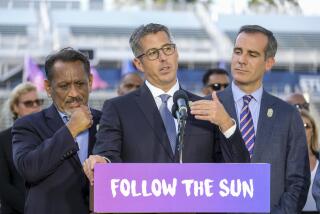Bertelsmann Expected to Name Ex-TV Exec to Lead Music Group
- Share via
Bertelsmann has decided to appoint a former television executive to run its music division after the sudden death of Rudi Gassner, industry sources said.
Gassner, who died of an apparent heart attack just days before he was slated to take the reins at Bertelsmann Music Group, will be replaced by Rolf Schmidt-Holtz, the 52-year-old former television head and chief creative officer at the German media conglomerate, industry sources said.
The promotion of Schmidt-Holtz comes at the same time Bertelsmann is pushing to close a proposed merger with EMI Group to create by far the world’s biggest music conglomerate.
Bertelsmann is counting on teaming Schmidt-Holtz, an experienced business manager based in Hamburg, with Ken Berry, a record industry veteran who has been running EMI’s music division for nearly five years. Under Bertelsmann’s plan, the two executives would run the combined operation as partners, with Schmidt-Holtz handling the business dealings and Berry calling the creative shots, people familiar with the negotiations said.
Bertelsmann declined to comment. The German conglomerate will wait until Friday to announce Schmidt-Holtz’s appointment out of respect for Gassner, who is scheduled to be buried today in Greenwich, Conn. The service is expected to be attended by Chairman Thomas Middelhoff and a number of Bertelsmann label chiefs and recording artists.
The logic behind tapping Schmidt-Holtz hinges on whether Bertelsmann can persuade EMI shareholders to approve the merger in the weeks ahead. Combining Bertelsmann’s music division with EMI would generate sales of about $10 billion and an artist roster including Whitney Houston, Christina Aguilera, Santana, the Beatles and Frank Sinatra.
Nevertheless, the deal could easily collapse should the merger fail to gain the approval of antitrust regulators in Europe and the U.S.
EMI was forced last year to abandon a similar merger proposal with Time Warner after running into opposition from the European Commission. Concerned that further consolidation in the music business would hurt consumers, European regulators objected on grounds that the number of global record companies would be reduced from five to four.
It’s unclear how the EMI deal proposed by Bertelsmann could overcome similar antitrust concerns.
Competitors suggest that Bertelsmann could try to appease regulators by shedding its minority-stake investment in Zomba Music, the hugely successful independent label that dominates the global music market with such pop stars as Britney Spears, the Backstreet Boys and ‘N Sync. If Zomba, which has its own international distribution system, did break away from Bertelsmann, that would conceivably create a more competitive landscape with five major record companies still operating.
EMI executives, however, are still smarting from the failed merger with Time Warner, and they have set a Jan. 31 deadline for Bertelsmann to hammer out a deal that will be satisfactory to regulators. Industry sources say Bertelsmann Chairman Middelhoff and EMI Chairman Eric Nicoli met this week and are close to delivering such a proposal, although the deal could still unravel.
In promoting Schmidt-Holtz, Bertelsmann is turning to a trusted insider who has worked at the company for nearly two decades. During the 1980s, the former journalist acted as editor in chief and publisher of Bertelsmann’s Gruner & Jahr magazine. During the 1990s, he helped orchestrate the merger of Bertelsmann’s television unit with Cie to create CLT-Ufa, Europe’s biggest broadcasting company.
Schmidt-Holtz ran CLT-Ufa until he was named Bertelsmann’s chief creative officer last year. He will move from Hamburg to New York and soon begin working out of Bertelsmann’s U.S. headquarters near Times Square.
More to Read
The biggest entertainment stories
Get our big stories about Hollywood, film, television, music, arts, culture and more right in your inbox as soon as they publish.
You may occasionally receive promotional content from the Los Angeles Times.










